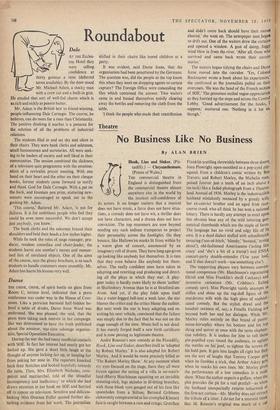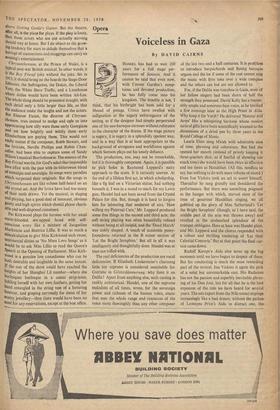Theatre
No Business Like No Business
By ALAN BRIEN Hook, Line and Sinker. (Pic- cadilly.) — Chrysanthemum. (Prince of Wales.) THE commercial theatre in England is distinguished from the commercial theatre almost anywhere else in the world by the insolent self-confidence of its. actors. It no longer matters that a musical does not have music, a farce does not have situa- tions, a comedy does not have wit, a thriller does not have characters, and a drama does not have conviction. The top mummers are now beyond needing any such tedious trumperies to project their personality across the footlights. On they bounce, like Hallowe'en masks lit from within by a warm glow of conceit,• announced by an imaginary roll of drums. They have long ago given. up looking like anybody but themselves. It is rare that they even behave like anybody but them- selves. The really confident ones have taken to adapting and rewriting and producing and direct- ing all the plays in which they star. A play- goer today is hardly more likely to shout 'author' in Shaftesbury Avenue than he is at Stratford-on- Avon. And yet, if the play folds upon itself like a water-logged bell-tent a week later, the star blames the critics and the critics blame the author. But next week the star is busy adapting and re- writing his next vehicle, convinced that the failure was simply due to the fact that he was not on the stage enough of the time. Music-hall is not dead. It has merely forged itself a new birth certificate and is now passing as legitimate theatre.
Andr6 Roussin's new comedy at the Piccadilly, Hook, Line and Sinker, describes itself as 'adapted by Robert Morley.' It is also adapted for Robert Morley. And it would be more precisely billed as 'The Robert Morley Show.' At any moment when my eyes focused on the stage, there they all were frozen against the setting of a villa in no-man's- land (Harry Hutchinson squatting on an invisible shooting-stick, legs akimbo in ill-fitting breeches, with those blank eyes gouged out of his face like spoonholes from a Stilton; Bernard Gribbons elaborately conspiratorial as his crumpled Kleenex face is caught between a cuss and cringe; Gretchen Franklin scuttling shrewishly between three doors; Joan Plowright open-mouthed as a pop-eyed piP- squeak from a children's comic written by Ben Travers; and Robert Morley, the Michelin man, poised forever just a tenth of an inch above a tin-tack) like a faded photograph from a Theatre' land Annual of 1936. Morley is the indestructible husband mistakenly menaced by a greedy wife, her ex-convict brother and an aged Irish race- course crook who all think he has won a national lottery. There is hardly any attempt to erect upon this obvious base any of the wild tottering geo- metrical rhomboids which are the staple of farce. The language has no vivid and edgy life of Its own. It is a dead dialect stuffed with schoolboyish Swearing (`son-of-bitch,' bloody,"bastard,"arsing about'), old-fashioned Americanese ('acting like crazy' and 'she's a bit of a tramp') and ENSA concert-party double-entendre ('Use your loaf, and if that doesn't work—use something else').
The supporting players vary between convert' tional competence (Mr. Hutchinson's ingratiating Oirish and Miss Franklin's shrill Cockney) and inventive caricature (Mr. Cribbins's Ealing comedy spiv). Miss Plowright vainly attempts to stiffen and shine up the rag-doll figure of the murderous wife with the high gloss of sophisti- cated comedy. But the stylish drawl and the boudoir sexiness of, say, a Fenella Fielding are beyond both her and her dialogue. While Mr. Morley relies entirely on that brand of panto- mime-horseplay where his bottom and his toP shrug and quiver at once with the same elephan- tine subtlety. It is useless for him to roll those pin-pupilled eyes round the audience, to agitate the wattles on his jowl, to tighten the screws on his bald pate. It gets him laughs all right but they are the sort of laughs that Tommy Cooper gets when he fumbles a trick, that Arthur Askey gets when he mocks his own lines. Mr. Morley gives the performance of a low comedian in a nude show. When the author expects a guffaw, when the plot provides the pit for a real pratfall—as when the husband unexpectedly returns unharmed at the first-act curtain—Mr. Morley does not extract the tribute of a titter. I do not for a moment think that M. Roussin's original was much of a cut above Getting Genie's Garter. But the theatre, after all, is the place for plays. if the play is lousy, then those actors who are not actually starving should stay at home. But I do object to the grow- ing tendency for stars to delude themselves that a barrage of mannerisms and muggings can carry an evening's entertainment.
Chrysanthemum, at the Prince of Wales, is a typical post-war British musical. In other words, it is the Boy Friend joke without the joke. Set in 1913, it should bring on the boards the Stage-Door Johnnies, the Suffragettes, the Dukes, the Liberal Vote, the White Slave Traffic, and a Limehouse Where Attlee would have been written Att-Lee. The whole thing should be presented straight, with each detail only a little larger than life, so that the audience make the laughs and not the actors. But Eleanor Fazan, the director of Chrysan- themum, tries instead to nudge and ogle us into appreciating how silly were those early Georgians and yet how brightly and wittily these early Elizabethans are guying them. This would not really matter if the composer, Robb Stewart, and the lyricists, Neville Phillips and Robin Chan- cellor, had been able to capture some of Sandy Wilson's musical Beerbohmerie. The essence of the Boy Friend was (is, for God's sake) that impossible love affair with the past with its bittersweet blend of nostalgia and neuralgia. Its songs were parodies Which surpassed their originals. BO the songs in Chrysanthetnum are like echoes half-heard on an old crystal set. And the lyrics have had too many of their teeth drawn. Yet the musical, in staging and playing, has a good deal of innocent, obvious gaiety and high spirits which should please charit- able and well-disposed customers. Pat Kirkwood plays the heroine with her usual Warm-blooded sex-appeal laced with self- conscious irony like a mixture of Jacqueline Mackenzie and Beatrice Lillie. It was as much a Miscalculation to give Miss Kirkwood such sweet, sentimental ditties as 'No More Love Songs' as it would be to ask Miss Lillie to read the Queen's Speech at the Opening of Parliament. Miss Kirk- wood is a genuine low comedienne who can be both desirable and laughable in the same instant. If the rest of the show could have reached the heights, of her Shanghai Lil number—where she burlesques burlesque in a comic strip-tease, tickling herself with her own feathers, getting her band entangled in the string vest of a hovering bouncer, and groping nervously for items of her Scanty jewellery—then there would have been no Ueed for any reservations, except at the box office.































































 Previous page
Previous page